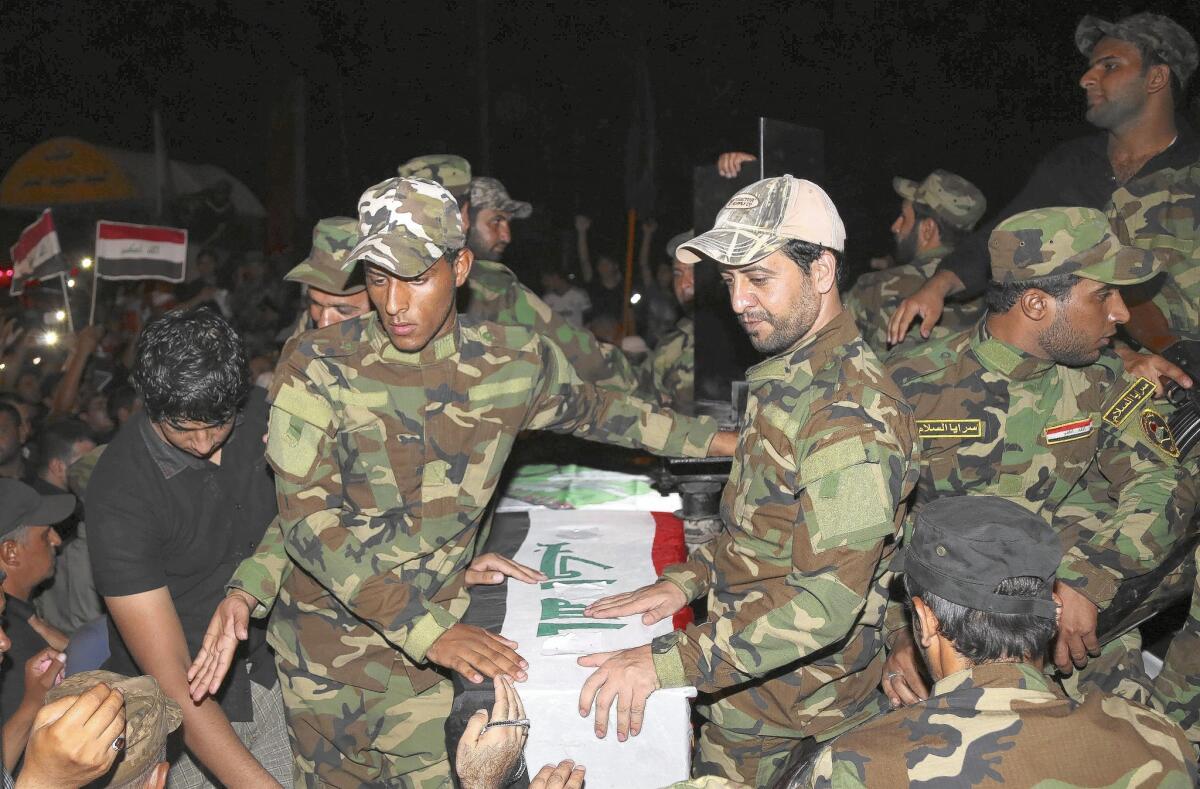Iran fills key role in battling Islamic State in Iraq

- Share via
Reporting from KHANAQIN, Iraq — In an isolated corner of northeastern Iraq, a foreign power has been a crucial contributor in a little-noticed front against the militant Islamic State — and it’s not the United States.
At his office here, Mala Bakhtiar, military supervisor of the Kurdish peshmerga forces and a local politician, spoke openly of comprehensive Iranian involvement in logistics, intelligence-sharing and provision of military equipment to Kurdish troops.
“They gave us rockets, cannons, maps,” a grateful Bakhtiar said of the Iranians, gesturing at the large-scale maps competing for wall space. “We needed these things badly.”
The Kurdish leader also confirmed the presence of consultants from the Pasdaran, also known as the Revolutionary Guard — who, he said, “were very helpful” as advisors in the ongoing battle to dislodge the Sunni extremists from the nearby strategic town of Jalawla and vicinity.
U.S. officials are loath to acknowledge that they are on the same side of the Iraqi battlefield as Shiite Muslim-dominated Iran, Washington’s 35-year adversary and the archenemy of a pair of staunch U.S. allies, Saudi Arabia and Israel.
Iran, which shares a 1,000-mile border with Iraq, has pointedly not been asked to join the new global alliance the Obama administration is building to counter Islamic State. And Secretary of State John F. Kerry has declared that Iran’s presence “would not be appropriate” at a global security conference set to begin Monday in Paris.
But denial cannot trump reality on the ground in Shiite-run Iraq, where Iran is indisputably a major player. Tehran was already a formidable presence before the first U.S. airstrikes targeting Sunni militant positions in northern Iraq last month. It was Iranian-backed Shiite militias that helped the ill-prepared Iraqi military thwart the extremists’ rampage toward Baghdad in June and July, blunting the militants’ advance.
Iran has moved quickly to assist both the Iraqi military and Kurdish peshmerga here in the north.
“We resorted to any group that would help,” the avuncular, mustachioed Bakhtiar explained.
“Iraq is now a stage for intervention from all countries of the world,” added Bakhtiar, also a leading figure with the Patriotic Union of Kurdistan, or PUK, one of the two major political parties in Iraq’s semiautonomous Kurdish region.
Many here question whether Islamic State poses any kind of direct danger to the United States. Unlike Al Qaeda, which severed ties to the group early this year, Islamic State has not proclaimed a global militant agenda, focusing instead on consolidating its self-proclaimed caliphate in the heart of the Middle East.
But there is no doubt that the hard-line Sunni faction is a threat to Shiite Iran, which fears radicalization of its own restive Sunni minorities in ethnic Baluch and Kurdish regions. The militants view Shiites and spinoff sects, such as the Alawites who run Syria’s government, as infidels. Islamic State has slaughtered hundreds, possibly thousands, of them.
“Iran cannot afford to neglect the security and stability of Iraq,” said Nader Karimi Juni, an independent analyst in Tehran. “They hate Shiites as apostates.”
The Iraqi town of Jalawla, in hands of Islamic State since mid-August, is less than 20 miles from the Iranian border and close to a major crossing between the two countries.
This sliver of Iraq, bisected by the Diyala River and its tributaries, is part of embattled Diyala province, an ethnically and religiously mixed area that is one of the major fronts in the campaign against Islamic State. Diyala was also a critical stronghold for Al Qaeda-linked militants during the U.S.-led occupation of Iraq that ended in 2011.
Today, Diyala is roughly divided among the forces of Islamic State, the Iraqi government and the peshmerga, who filled the security void when Iraqi government forces fell back in June in the face of the Sunni militants’ advance. The extremists pushed forward again in early August, forcing a peshmerga retreat.
After more than a month of fighting, Kurdish commanders say Islamic State insurgents have been cornered in the largely Sunni towns of Saadiya and Jalawla. The front line has been relative static in recent weeks.
The Kurdish military blueprint is simple enough: Roll back Islamic State in the Kurdish areas, while Iraqi pro-government forces, including Shiite paramilitary groups, squeeze militants from the south in a pincer maneuver.
Here again, Iran’s influence is crucial; the main Iraqi Shiite militia coordinating with the Iraqi forces to the south is the Badr Brigade, which has a “long history of being trained by Iran,” noted Hamid Reza Taraghi, a Tehran-based analyst.
“When they [the Badr Brigade fighters] require any assistance, we give it to them,” Taraghi said in a telephone interview from Tehran.
With the peshmerga poised to advance, Kurdish authorities are still hopeful that U.S. military support will materialize, especially in light of the expanded American mission outlined by President Obama last week in his nationally televised address.
“I would like to tell them to hurry up,” Bakhtiar said of the White House. “We await them with great anticipation.”
Special correspondent Bulos reported from Khanaqin, Iraq, and Times staff writer McDonnell from Beirut. Special correspondent Ramin Mostaghim in Tehran contributed to this report.
More to Read
Sign up for Essential California
The most important California stories and recommendations in your inbox every morning.
You may occasionally receive promotional content from the Los Angeles Times.














